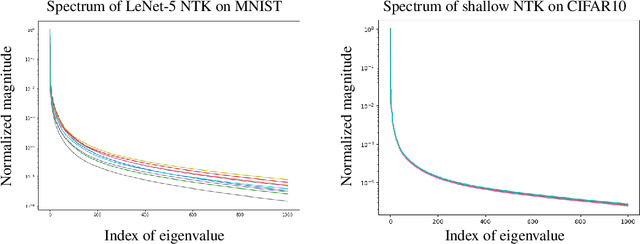Spectral Bias Outside the Training Set for Deep Networks in the Kernel Regime
Paper and Code
Jun 06, 2022
We provide quantitative bounds measuring the $L^2$ difference in function space between the trajectory of a finite-width network trained on finitely many samples from the idealized kernel dynamics of infinite width and infinite data. An implication of the bounds is that the network is biased to learn the top eigenfunctions of the Neural Tangent Kernel not just on the training set but over the entire input space. This bias depends on the model architecture and input distribution alone and thus does not depend on the target function which does not need to be in the RKHS of the kernel. The result is valid for deep architectures with fully connected, convolutional, and residual layers. Furthermore the width does not need to grow polynomially with the number of samples in order to obtain high probability bounds up to a stopping time. The proof exploits the low-effective-rank property of the Fisher Information Matrix at initialization, which implies a low effective dimension of the model (far smaller than the number of parameters). We conclude that local capacity control from the low effective rank of the Fisher Information Matrix is still underexplored theoretically.
 Add to Chrome
Add to Chrome Add to Firefox
Add to Firefox Add to Edge
Add to Edge